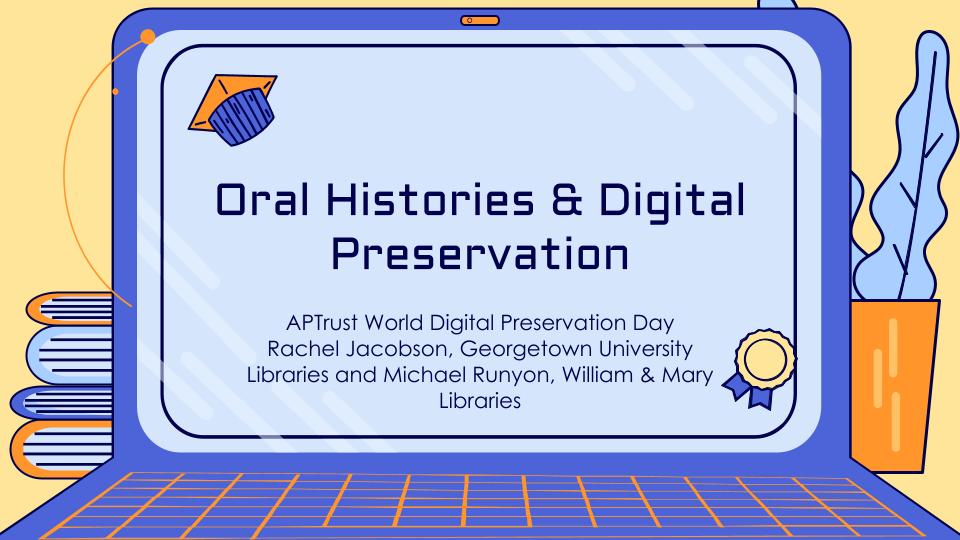World Digital Preservation Day 2024: Raising Awareness for Oral Histories at Risk

World Digital Preservation Day is organized by the Digital Preservation Coalition (DPC), a global membership organization dedicated to ensuring the longevity of digital assets. Through their annual Bit List of Endangered Species, the DPC highlights digital materials at high risk of loss.
The 2024 Bit List of Endangered Digital Species has classified oral histories as “Endangered,” with a noted trend toward even greater risk. The urgency to act within the next three years underscores the critical need to preserve these invaluable narratives, particularly given the increased risk of degradation and obsolescence of media holding such histories.
During our recent APTrust event, Rachel Jacobson from Georgetown University Libraries and Michael Runyon from William & Mary Libraries provided an overview of preserving oral histories in the digital realm. Their insights demonstrated why these collections are vital and posed questions about the accessibility and digital preservation of these increasingly vulnerable resources. Below is a summary of their presentation highlights:
- The Importance of Oral Histories: Oral histories are crucial in documenting community narratives, especially for underrepresented voices. They provide a rich resource for understanding cultural and societal heritage. Yet, they come with challenges tied to audio-visual formats, including complex permissions and evolving ethical practices when working with interview subjects.
- Analog to Digital: Michael detailed how outsourcing digitization has brought historical recordings new life from older analog media like cassette tapes and sound reels, such as for the James City County Oral History Collection. High-resolution WAV files are now used as preservation copies, while MP3s serve as access copies. These efforts are reinforced by checksums and metadata, which are crucial for ongoing preservation and integrity checks.
- Born-Digital Collections: Rachel highlighted We Are Georgetown: Celebrating our Black History, an ongoing oral history project collecting the stories of Georgetown’s Black alumni. These born-digital recordings are already in more stable formats, allowing easier access and preservation. The library publishes these in partnership with the Georgetown University Black Alumni Council, which conducts the interviews. Today, it is more common for members of minority or marginalized groups to conduct oral histories for their communities, which is one example of practices improving. The project includes closed captioning and carefully crafted transcripts, with policies ensuring the preservation and accessibility of these voices.
- Policies and Good Practices: Both Rachel and Michael shared insights on their institutional policies that govern access, copyright, and the ethical handling of personal narratives. William & Mary recently standardized their templates for oral history collections, aiming for item-level descriptions and various access levels. Georgetown operates under policies set by both the Digital Scholarship and Technology Services department as well as the Booth Family Center for Special Collections. These guidelines help safeguard oral histories, especially those that require sensitive handling and regulated access.
Rachel and Michael ended with the following considerations.
- What do you wish oral historians understood about digital preservation?
- What is your practice for handling release forms for interviews that took place before the internet was a regular part of peoples’ lives?
- How do you handle long term storage for collections with limited and/or changing access levels?
- How much, if at all, do different access levels come into play when considering an oral history acquisition?
Rachel and Michael’s presentation highlighted how vital it is for libraries and archives to store these histories and actively engage in good preservation practices. Ensuring accessibility while respecting each oral history's original context and permissions is essential.
We’ll be adding a link to the recording of this session here once it’s published, so stay tuned! In the meantime, let’s continue to advocate for and celebrate the preservation of our shared digital heritage.
UPDATE: A recording of this webinar is available on YouTube.